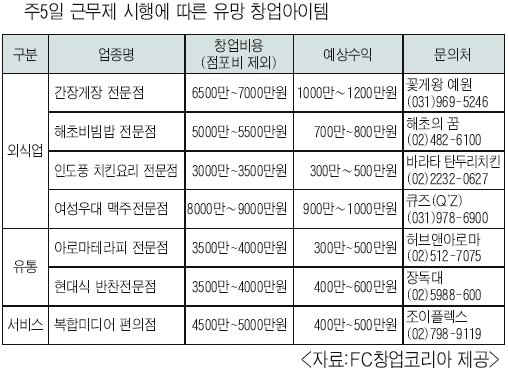(Small businesses) Implications of the 5-day workweek
| Two articles on the implications of the 5-day workweek in Chosôn Ilbo: <고객과 유대감 형성이 중요·주택가·도심외곽 활기띨 듯>, written by a small business consultant, which should be taken into account when reading. 바야흐로 주5일 근무 시대가 활짝 열리고 있다. 2002년 금융권을 중심으로 시행됐던 주5일 근무가 오는 7월부터는 공기업과 1000명 이상 사업장에도 본격적으로 시행된다. 또 오는 3월부터는 전국의 초·중·고교 중 일부 학교도 주5일 수업을 시범적으로 실시한다. 주5일제는 이제 코앞에 바짝 다가온 현실이 됐다 (Government-owned companies and private companies with more than 1000 employees begin the 5-day workweek in July this year, and select grammar, middle and high school in March this year.) It's expected that residence areas (chut'aekka) will emerge as important business areas (sanggwôn 商圈), when families have more time to spend together with the implementation of the 5-day week. Also the areas around cities or downtown areas are expected to do well, with families wanting to get out of the cities. Rejô sanôp (leisure business) will do well, as has happened in developed nations (sônjin'guk) with a 5-day week. <'주5일 근무'시대 창업…외식형? 레저형? 편의형?> 올 7월부터 단계적으로 시행되는 주5일 근무제는 창업시장에 큰 변화를 가져올 전망이다. 한동안 침체에 빠졌던 가든형 음식점이나 전원 카페 등이 살아나고, 주택가 상권도 활기를 띨 것으로 보인다. 또 늘어난 여가시간을 활용하는 레저와 외식산업은 호재가 될 전망이며, 이틀간의 주말시간을 활용하는 투잡스(Two jobs)족 등장도 예상된다. There's a list of businesses which are expected to do well with the coming 5-day work-week, with couple of businesskeepers introduced more closely. Note again the use of chônmunjôm, "specialist shop" as the designation for these businesses, giving the air of expertise and professionalism. (Not that these shopkeepers didn't have expertise and professionalism, but there's still a long way in status to "professional" profession.)  Categories at del.icio.us/hunjang: businesskeepersㆍKoreaneconomyㆍneighborhood |



Comments to note "(Small businesses) Implications of the 5-day workweek" (Comments to posts older than 14 days are moderated)
Write a Comment